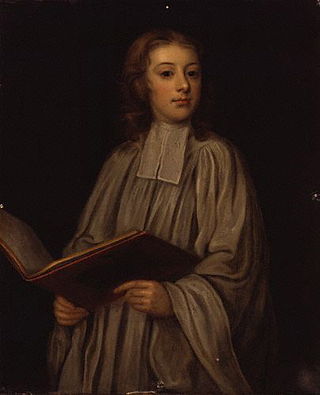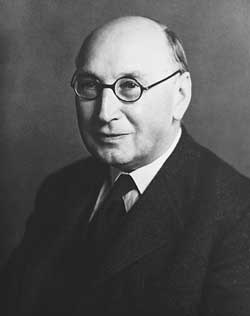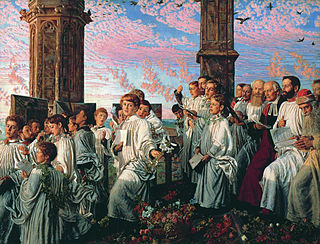Related Research Articles

Sir Walter Parratt was an English organist and composer.
Christopher Urswick (1448–1522) was a priest and confessor of Margaret Beaufort. He was Rector of Puttenham, Hertfordshire, and later Dean of Windsor. Urswick is thought to have acted as a go-between in the plotting to place her son Henry VII of England on the throne.

Sir John Goss was an English organist, composer and teacher.

William Croft was an English composer and organist.
Richard Farrant was an English composer, musical dramatist, theatre founder, and Master of the Children of the Chapel Royal. The first acknowledgment of him is in a list of the Gentlemen of the Chapel Royal in 1552. The year of his birth cannot be accurately determined. During his life he was able to establish himself as a successful composer, develop the English drama considerably, found the first Blackfriars Theatre, and be the first to write verse-anthems. He married Anne Bower, daughter of Richard Bower who was Master of the Chapel Royal choristers at the time. With Anne he conceived ten children, one of whom was also named Richard.

Sir William Henry Harris was an English organist, choral trainer and composer.

James Nares was an English composer of mostly sacred vocal works, though he also composed for the harpsichord and organ.
Sir George Job Elvey (1816–1893) was an English organist and composer.
John Travers was an English composer who held the office of Organist to the Chapel Royal from 1737 to 1758. Before filling several parochial posts in London he had been a choir boy at St. George's Chapel, Windsor, and a pupil of Johann Christoph Pepusch.
Malcolm Archer is an English composer, conductor and organist. He was formerly Organist and Director of Music at Bristol Cathedral, at Wells Cathedral and at St Paul's Cathedral and Director of Chapel Music at Winchester College.

Sir John Frederick Bridge was an English organist, composer, teacher and writer.

The Choir of St George's Chapel at Windsor Castle exists to sing services in St George's Chapel at Windsor Castle.
Theodore Aylward (1730–1801) was an English composer and organist. He was a member of the Royal Society of Musicians in 1763 and gained a prize medal from the Catch Club in 1769. He was organist successively of St Lawrence Jewry and St Michael, Cornhill (1769–1781), in London, and of St. George's Chapel, Windsor (1788–1801). As well as these appointments, he was the Gresham Professor of Music (1771–1801). During his lifetime he composed musical dramas, songs, canzonets and glees.
John Worgan (1724–1790) was an organist and composer of Welsh descent. He is best known for playing the organ at Vauxhall Gardens, the London public pleasure garden in the mid 18th century.

Thomas Tudway was an English musician and Professor of Music at Cambridge University. He is known as a composer, and for his compilation of a collection of Anglican church music.
John Sale was an English bass singer of church music, and a singer and composer of glees.

Benjamin Rogers was an English organist and composer, widely known in Europe in his time. Modern taste prefers his consort music, where his reputation in the 18th century was for liturgical music and anthems. His Hymnus Eucharisticus beginning Te O Patrem colimus is sung annually on Magdalen Tower on May Day morning.

Benjamin Britten's Jubilate Deo is a sacred choral setting of Psalm 100 in English, written in 1961 for St George's Chapel, Windsor Castle, "at the request of H.R.H. The Duke of Edinburgh". Britten scored the joyful music in C major for four-part choir and organ. A late companion piece to his 1934 Te Deum in C, it is also known as his Jubilate in C. It has been performed and recorded often, including on Prince Philip's 80th and 90th birthdays, and for his funeral service on 17 April 2021.
Luke Bond is a British organist and is currently Assistant Organist at St George's Chapel, Windsor Castle, where he played prominently for the wedding of Prince Harry and Meghan Markle and the funeral of Prince Philip, Duke of Edinburgh. He has appeared internationally, and has made recordings of organ music and choral music.
George Jackson Lambert was an English organist and composer, for many years organist of Beverley Minster.
References
- ↑ John Hawkins (1776). A General History of the Science and Practice of Music. Payne. pp. 26–.
- ↑ . Dictionary of National Biography . London: Smith, Elder & Co. 1885–1900.